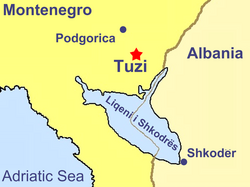Tuzi
This article has multiple issues. Please help improve it or discuss these issues on the talk page. (Learn how and when to remove these messages)
|
Tuzi
Тузи | |
|---|---|
Town and municipality | |
 View of the Prokletije | |
 | |
| Country | |
| Municipality | Podgorica Municipality |
| Population (2003) | |
• Total | 3,900 |
| Time zone | UTC+1 (CET) |
| • Summer (DST) | UTC+2 (CEST) |
| Postal code | 81206 |
| Area code | +382 20 |
| Vehicle registration | PG-T |
Tuzi (Template:Lang-cg, pronounced [tǔːzi]; Template:Lang-sq) is a small town in the Podgorica Municipality, Montenegro, located along a main road between the city of Podgorica and the Albanian border crossing, just a few kilometers north of Lake Skadar. The exact location of Tuzi is 42°21′56″N 19°19′53″E / 42.36556°N 19.33139°E. Tuzi is an urban municipality, a subdivision of Podgorica Municipality.
Geography
Tuzi is situated to the northwest of Lake Skadar, 10 km from Podgorica, 150 km from Dubrovnik (Croatia) and 130 km to Tirana (Albania). It is located in surrounded by forests and mountains that are further connected with Prokletije. As in all cities in Montenegro, Tuzi has a health centre, elementary school "Mahmut Lekić" and since 2004 the high school "25 Maj". KIC 'TUZI'. Later developments also include a football stadium. Korita, Lake of Rikaveci, Vitoja, Cijevna river etc.
History
The town of Tuzi is situated between Podgorica and the Skadar lake. The Albanian community of Tuzi descend from the surrounding tribes of Hoti, Gruda, Zatrijebač (Triesh) and Koći (Koja), part of the Malësor tribes. Montenegrin Albanians view the town as an important cultural and traditional center. Although Tuzi is historically an Albanian-majority town, it is also home to smaller ethnic groups, such as the Bosniaks (Muslims) and Montenegrins.
In 1911, for the first time since the era of George Kastrioti, the Albanian flag was risen on top of the Dečić Mountain in Tuzi during the Battle of Dečić.[citation needed] In the battle, Ded Gjo Luli led the Albanians to victory against the Ottomans which marked the turning point in Albanian self-determination.
Municipality
Apart from Tuzi, the Urban Municipality of Tuzi contains the following villages.[citation needed]
- Arza / Arrëz
- Barlaj / Bardhaj
- Benkaj / Bënkaj
- Budza / Budëz
- Cijevna / Cem
- Delaj
- Dinoša / Dinoshë
- Donja Selišta / Selishtë
- Donji Milješ / Milesh i Ultë
- Drešaj / Dreshaj
- Drume
- Dušiće / Dushi
- Gornja Selišta / Selishtë
- Gornji Milješ / Milesh i Epërme
- Gurec / Gurre
- Helmnica / Helmenicë
- Koći / Kojë
- Kotrabudan / Kodërbudan
- Krševo / Kreshe
- Lovka / Llofkë
- Lekići / Lekaj
- Drume
- Mužečka / Muzheçku
- Nabon / Nabome
- Podhum / Nënhelm
- Nikmaraš / Nikmarashaj
- Omerbožoviće / Omerbozhaj
- Pankal
- Pikalj / Pikalë
- Prifti / Priftën
- Kuće Rakića / Shtëpia e Rakise
- Rudine / Rudinë
- Skorać / Skorra
- Spinja / Spijë
- Stjepovo / Stjeposh
- Sukuruć / Sukraq
- Šipčanik / Shipçanik
- Trabojin / Traboine
- Tuzi
- Vladne / Vllanë
- Vranj / Vranë
- Vuksanlekiće / Vuksanlekaj
Economy
The urban municipality of Tuzi in the year 2005 has had a budget of over 3.500.000 euros, but in the year 2012 it has a decrease amount of budget to 45.000 euros.
Sports
Demographics
According to 2011 census, the town of Tuzi has a population of 4,748,[1] while Tuzi Urban Municipality has 12,096 residents.[2] Out of this, roughly half are Albanians, but there is also a significant percentage of Bosniaks, Muslims by nationality, and Montenegrins.
- Albanians - 2,383
- Bosniaks - 932
- Muslims - 554
- Montenegrins - 554
- Romani - 111
- Serbs - 13
- Others - 172
- Undeclared/undefined - 122
- Regional affiliation - 7
- Total - 4,748
Religious demographics
- 47.9% - Islam
- 50.1% - Roman Catholic
- 2% - Eastern Orthodox
External links
References
- ^ http://www.monstat.org/userfiles/file/popis2011/podaci%20naselja/Tabela%20N1.xls Population and Housing Census in Montenegro - ethnicity

- ^ Template:PDFlink

